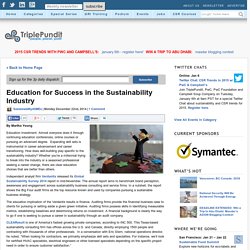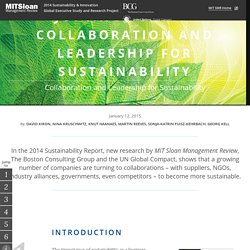

Economy & Jobs | News.
Network for Business Innovation and Sustainability » New Challenges Reshaping Corporate Social Responsibility. Business has the capacity, innovation and duty to carve a new path toward sustainability, says Karl Ostrom, PhD, in his latest white paper titled New Challenges Reshaping Corporate Social Responsibility.

The co-founder and co-executive director of the Network for Business Innovation and Sustainability (NBIS) released his paper today at the 2014 GoGreen Seattle Conference. “As usual, NBIS is pushing us all to the next level on our sustainability journeys with this new white paper,” said Toronto-based author and speaker Bob Willard of Sustainability Advantage. “Karl defines how companies can respond to the sustainability imperative and position themselves to thrive on a finite, crowded, resource-constrained, climate-destabilized planet.
We urgently need new visionary benchmarks of environmentally and socially responsible business performance, and NBIS is helping to define them. Network for Business Innovation and Sustainability » B Corporations, Benefit and Social Purpose Corporations: Impact-Driven Companies. B Corporations, Benefit and Social Purpose Corporations: Impact-Driven Companies Download our white paper An NBIS White Paper Business has a demonstrated power to deliver results.

However, too often these results are biased toward the benefit of shareholders and at odds with what makes our society a better place. A new type of corporation with a formalized purpose that includes generating positive impact for society in its core was needed. Energy Efficiency: The Secret Revolution — Solutions Journal Summer 2014. Michael Liebreich, chairman of Bloomberg New Energy Finance’s advisory board, notes that the U.S. fracking revolution and the consequent 2004–13 rise in domestic oil output displaced oil imports equivalent to 10 percent of domestic consumption — while two little-noticed demand-side trends, less driving and more-efficient vehicles, saved 18 percent, nearly twice as much.

Drilling’s impressive achievements were almost lapped by demand-side shifts. Yet those saved barrels were nearly invisible because we can’t see energy we don’t use or buy. Similarly, co2scorecard.org showed that in 2012, lower U.S. electric intensity — using less electricity to produce a dollar of real GDP — displaced nearly twice as much domestically burned coal as expanded natural gas use did. In that year, weather-adjusted electric intensity fell by an unprecedented 3.4 percent, saving 145 TWh (billion kilowatt-hours). Moreover, natural gas additions didn’t deliver some key benefits claimed for them.
Social Impact & Assessment Tools. GIIRS Ratings. Within 2 Years, a Quarter of the World’s Carbon Emissions Are Likely to be Priced. It often surprises people to hear that big companies like Exxon use a “shadow carbon price” when assessing future investment opportunities (in other words, they assume a price on carbon even where/when there isn’t one).

After all, if you only pay attention to the headlines, it sounds like the big story on climate change is that nobody’s doing anything and we’re all doomed. World’s Top Sustainable Solution: Pedal-Powered Recycling. Tonight in Copenhagen, Denmark, Sustainia, a Scandinavian think tank working to scale the deployment of innovative solutions, announced the winner of its 2014 Sustainia Award to the Nigerian initiative Wecyclers.

Wecyclers enables low-income communities to make money from waste piling up in their streets. By deploying a fleet of cargo bicycles to collect and recycle unmanaged waste in Nigeria’s city of Lagos, Wecyclers lets families exchange garbage for consumer goods via an SMS-based point system. “The threats from climate change are real and they are here. But so are the solutions. Education for Success in the Sustainability Industry. By Martha Young Education investment: Almost everyone does it through continuing education conferences, online courses or pursuing an advanced degree.

Expanding skill sets is instrumental in career advancement and career transitioning. How does skill-building play specific to the sustainability industry? Whether you’re a millennial trying to break into the industry or a seasoned professional seeking a career change, there are clear education choices that are better than others.
Independent analyst firm Verdantix released its Global Sustainability Survey 2014 report in mid-November. The education implication of the Verdantix results is finance. CLEAResult is one of America’s fastest growing private companies, according to INC 500. Joining Forces: Collaboration and Leadership for Sustainability. The Strategic Relevance of Sustainability Collaborations In the late 1990s, many companies embarked on their first sustainability forays.

Often internal, these efforts addressed low-hanging fruit such as energy efficiency or minimizing waste — essentially, cost-cutting under a different name. But as the sustainability issues that can affect business — such as social instability, climate change and resource depletion — become more important, companies realize that collective action is necessary to protect the interests of the company and society. “Whether you’re a business or an organization, part of civil society or a public sector voice, there is an understanding that complex problems require perspectives from all three of these constituencies,” comments Patrick Hynes, deputy director of member relations at the Clinton Global Initiative. “The number of organizations working together has increased over the past few years along with the sense of urgency to collaborate.”